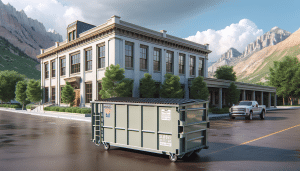Welcome to our blog post where we explore the future of garbage services and the exciting innovations and technologies that are reshaping the industry. As waste management becomes increasingly important for our environment and communities, it is crucial to stay informed about the latest advancements that will shape a cleaner and more sustainable future.
Contents
- 1 Introduction
- 2 Section 1: The Evolution of Garbage Services
- 3 Section 2: Cutting-Edge Technologies in Waste Management
- 4 Section 3: Innovations in Recycling and Composting
- 5 Section 4: Smart Waste Collection Systems
- 6 Section 5: Sustainable Waste-to-Energy Solutions
- 7 FAQ (Frequently Asked Questions)
- 7.1 Q: What are the emerging technologies in garbage services?
- 7.2 Q: How can smart waste collection systems improve efficiency?
- 7.3 Q: Are there any innovations in recycling and composting?
- 7.4 Q: What role does waste-to-energy play in sustainable garbage services?
- 7.5 Q: How can I request garbage services from Utah Dumpster Rentals?
- 8 Conclusion
Introduction
Garbage services have come a long way, evolving from simple waste collection to sophisticated systems that prioritize efficiency, sustainability, and environmental responsibility. In this article, we will delve into the key factors and technologies that are revolutionizing the way we manage waste. From cutting-edge advancements in waste collection and recycling to the emergence of smart waste management systems, we will explore the exciting future that lies ahead.
Section 1: The Evolution of Garbage Services
Over the years, garbage services have undergone significant transformations. Traditional waste collection methods involved manual labor and basic disposal practices. However, with growing environmental concerns and the need for more efficient processes, the industry has adapted and improved.
Today, garbage services encompass a wide range of activities, including waste collection, sorting, recycling, composting, and proper disposal. The focus has shifted towards reducing landfill waste, promoting recycling, and embracing sustainable alternatives. As we move towards the future, technology will play a vital role in enhancing garbage services and achieving greater sustainability.
Section 2: Cutting-Edge Technologies in Waste Management
In recent years, technological advancements have revolutionized waste management practices. Let’s explore some of the key technologies that are transforming the industry:
Sensor-Based Waste Sorting:
Innovative sensor-based waste sorting systems utilize artificial intelligence (AI) and machine learning algorithms to automatically identify and separate different types of waste. These systems enable efficient recycling and reduce contamination, leading to higher recycling rates and reduced environmental impact.
Robotic Waste Collection:
Robots are being developed to streamline waste collection processes. These robots can navigate through streets, collect garbage, and transport it to designated locations. By automating waste collection, this technology reduces labor costs and improves overall efficiency.
Internet of Things (IoT) in Waste Management:
The Internet of Things has made its way into waste management, enabling real-time monitoring and optimization of waste collection routes. IoT sensors placed in garbage bins provide data on fill levels, allowing garbage trucks to optimize their routes and reduce unnecessary trips.
Section 3: Innovations in Recycling and Composting
Recycling and composting are key pillars of sustainable waste management. In recent years, several innovations have emerged to improve these processes and make them more efficient:
Advanced Sorting Technologies:
Advanced sorting technologies, such as optical sorting machines, use advanced sensors and algorithms to identify and separate recyclable materials more effectively. These technologies increase recycling rates and reduce contamination, ensuring a higher quality of recycled materials.
Closed-Loop Recycling:
Closed-loop recycling systems aim to create a circular economy by recycling materials and reintroducing them into the production process. By reducing the reliance on virgin materials, closed-loop recycling minimizes resource depletion and reduces waste generation.
Composting Innovations:
Innovations in composting techniques have made it easier and more efficient to turn organic waste into nutrient-rich compost. This compost can be used in agriculture, landscaping, and horticulture, reducing the need for chemical fertilizers and closing the nutrient loop.
Section 4: Smart Waste Collection Systems
Smart waste collection systems leverage technology to optimize garbage collection routes, reduce costs, and enhance efficiency:
Route Optimization:
Using real-time data from sensors placed in garbage bins, smart waste collection systems optimize collection routes to minimize fuel consumption and reduce carbon emissions. This not only improves operational efficiency but also contributes to a cleaner environment.
Automatic Bin Monitoring:
Smart waste collection systems utilize sensors to monitor the fill level of garbage bins. This data is transmitted to waste management companies, enabling proactive collection and preventing overflowing bins. It eliminates unnecessary trips and ensures timely pickups.
Data-Driven Decision Making:
With the help of data analytics, smart waste collection systems provide valuable insights into waste generation patterns. Waste management companies can make informed decisions about resource allocation, route planning, and service optimization, leading to more effective and sustainable garbage services.
Section 5: Sustainable Waste-to-Energy Solutions
Waste-to-energy solutions offer an alternative approach to waste management, where waste is converted into usable energy:
Incineration with Energy Recovery:
Modern incineration facilities use advanced technologies to burn waste at high temperatures, generating heat and electricity. This energy can be used to power homes, businesses, or even be fed back into the grid, reducing reliance on fossil fuels.
Anaerobic Digestion:
Anaerobic digestion involves the decomposition of organic waste in the absence of oxygen, producing biogas and nutrient-rich digestate. Biogas can be used to generate electricity and heat, while the digestate can be used as a fertilizer.
Plasma Gasification:
Plasma gasification is a cutting-edge technology that converts waste into synthetic gas through a high-temperature, oxygen-starved process. The synthetic gas can be used to produce electricity or as a chemical feedstock.
FAQ (Frequently Asked Questions)
Q: What are the emerging technologies in garbage services?
A: Some of the emerging technologies in garbage services include sensor-based waste sorting, robotic waste collection, and the Internet of Things (IoT) for waste management.
Q: How can smart waste collection systems improve efficiency?
A: Smart waste collection systems optimize collection routes, monitor bin fill levels, and provide data-driven insights for better decision making. These systems enhance efficiency, reduce costs, and contribute to a cleaner environment.
Q: Are there any innovations in recycling and composting?
A: Yes, innovations such as advanced sorting technologies, closed-loop recycling, and composting techniques have improved recycling and composting processes, making them more efficient and sustainable.
Q: What role does waste-to-energy play in sustainable garbage services?
A: Waste-to-energy solutions, including incineration with energy recovery, anaerobic digestion, and plasma gasification, offer sustainable alternatives by converting waste into usable energy, reducing landfill waste, and mitigating environmental impact.
Q: How can I request garbage services from Utah Dumpster Rentals?
A: To request garbage services from Utah Dumpster Rentals, please call us at 801-877-3109 or visit our website at www.utahdumpsterrentals.com to fill out our online form.
Conclusion
The future of garbage services holds immense promise, with innovative technologies and sustainable practices reshaping the industry. From sensor-based waste sorting to smart waste collection systems and waste-to-energy solutions, Utah Dumpster Rentals is committed to providing efficient and environmentally responsible garbage services. To request our services, call us at 801-877-3109 or visit www.utahdumpsterrentals.com today.




